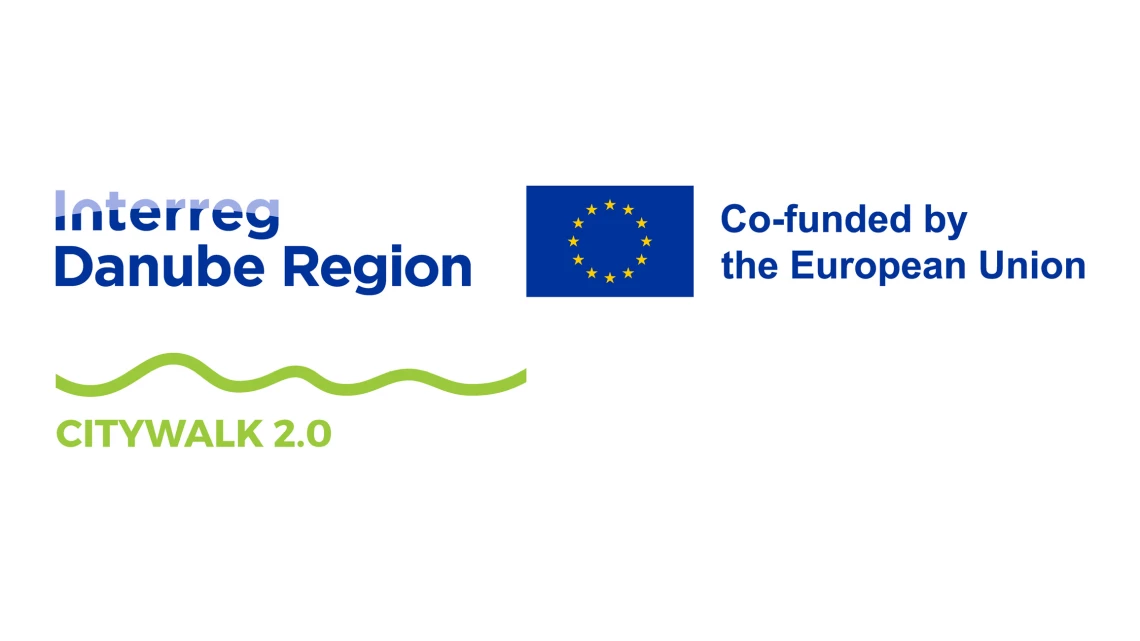
Project acronym: CityWalk2.0
Project title: Together for Energy-efficient Urban Mobility: Decreasing Carbon Intensity of Urban Transport by supporting Shift to Active Urban Mobility through rethinking street design and changing travel behaviour
Programme: Interreg Danube Region Programme
Duration: 01/2024 - 06/2026
Partner countries: Slovenia, Romania, Hungary, Croatia, Austria, Bosnia and Herzegovina, Moldova, Montenegro, Serbia, Czechia
CityWalk2.0 builds on the heritage of CityWalk (2016-19), awarded the Regio Stars Public Choice Award. The acceleration of climate change, the energy crisis calls for imminent changes on all fronts where we can significantly reduce energy use and GHG emissions. Urban mobility is a major contributor to both – its transformation is inevitable and urgent.
CityWalk2.0’s main goal is to promote energy transition in the transport sector by drastically reducing energy use of urban transport. The quickest, most efficient and cheapest way is to shift from extremely energy-intensive (and inefficient) car-based mobility to active forms of mobility (walking, cycling), micro-mobility and public transport the primary means.
CityWalk had a planning orientation with a walkability focus and targeted mostly the city level, CityWalk2.0 focuses on implementing the transformation both on the city and citizen level. Key elements of CityWalk 2.0: (i) redesigning streets to encourage active mobility and discourage car use, (ii) changing the travel behaviour of citizens, and (iii) strengthening the political will and commitment (crucial condition!) to implement the transformation.
After establishing the state-of-the art and presenting it in the Baseline Study, we review the current street design and travel behaviour in partner cities and identify main challenges and we design a transnational strategy (O1.1). We train the representatives of partners in street re-design and travel behaviour change (capacity building) enabling them to translate and adapt the main findings of the strategy in local plans. We design innovative, practical toolkits (3), while partners – using the knowledge and methods they have been provided - design local plans (O1.2) and action plans for pilot actions. City partners implement and assess pilots (O 2.1) with the support of knowledge providers to test and validate the toolkits. After having been tested and validated, all of these will eventually form our solutions. So, we develop 3 toolkits, implement 3 pilot actions, and deliver 3 solutions (O2.2). Finally, our partnership will also take specific steps to strengthen the commitment of decision-makers and to disseminate the solutions tailored to the target group beyond the partnership. We also identify specific policy changes necessary to implement on local and transnational level, and decision-makers will sign a position paper officially confirming and cementing the cooperation of partner cities and organisations (O3.1).
The 14 partners from 10 countries compose a synergic, professional partnership tailor-made to the project objectives in terms of geography, type of partner and expertise. 4 knowledge providers and 10 territorial partners ensure the balance of the necessary knowledge, piloting and policy proposals. The partnership is balanced in terms of old CityWalk partners and new partners, EU members and non-EU members.
Since the drivers of climate change are transnational (and global), not limited by regional/national borders, widespread and strong international cooperation is needed.
This project is supported by the Interreg Danube Region Programme with co-financing from Interreg Funds and the Romanian Government.
Project Facebook: https://www.facebook.com/CityWalk.project
Project website link: https://interreg-danube.eu/projects/citywalk-2-0


